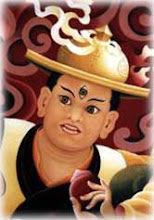Some people criticise Dorje Shugden practitioners for being 'isolationist' or 'sectarian', but it's important to understand why these perceptions have come about because it may appear that 'Shugdenpas' have deliberately decided to separate from Tibetan society or Tibetan Buddhism as taught by the Dalai Lama, however, as will be explained, this is not the case.
 |
Despite showing an open and accommodating face to Westerners, the Dalai Lama is a religious dictator who controls Tibetan Buddhism completely |
The principal cause of isolationism is ostracism by the Fourteenth Dalai Lama for political reasons. The Dalai Lama has banned the practice of Dorje Shugden, but unlike some religious disagreements where there is a 'live and let live' attitude, the Dalai Lama will never allow anyone to remain neutral on the issue. He has forced Tibetans to swear an oath in front of the Tibetan protectoress Palden Lhamo not to share material or spiritual resources with Shugden practitioners. Thus, it's not possible to abstain or remain neutral on this issue if you are Tibetan, because if you do not swear an oath, you are excluded from Tibetan society.
This ostracism began very early on, in fact, as soon as the Dalai Lama decided, for incorrect reasons, to stop practising Shugden. He then formed a plan to destroy the practice by exploiting the blind faith of the Tibetan people which has been encouraged by giving many public Kalachakra empowerments. The problems started in 1976 when the Dalai Lama gave up the practice. This caused many problems from the beginning. Geshe Kelsang Gyatso explained how this ostracism began:
 |
Out of sectarianism, the Dalai Lama has made it impossible for Shugdenpas to be his students |
Lama Yeshe was the general spiritual director of Manjushri Center, while I had the responsibility of organizing the daily programmes. We were both very happy to have the picture of HH the Dalai Lama on the shrine because we hoped that the people of Manjushri and HH Dalai Lama would develop a good spiritual connection and relationship. Many times we invited the Dalai Lama to come to Manjushri Centre, although we both knew, even then, that he had rejected the practice of Dorje Shugden. We assumed it was not his real intention because we found it difficult to believe that he really wanted to destroy the practice of Dorje Shugden.
So for a long time we continued to practise Dorje Shugden and kept faith in the Dalai Lama. Then later the situation deteriorated because he intensified his ban on Dorje Shugden worship. I heard that he said in public that those who practise Dorje Shugden cannot be my friend. Then my mind gradually changed, especially as we received criticism from people who were saying that Manjushri Centre had broken its guru devotion to the Dalai Lama because of our continued practice of Dorje Shugden. As his picture was on our shrine, people believed that he was our root Guru -- on the other hand because we practised Dorje Shugden people thought we were against the Dalai Lama. Due to this contradiction we received a lot of criticism.
The Dalai Lama never visited Manjushri Centre because he was displeased that Lama Yeshe and Geshe Kelsang continued to practise Dorje Shugden.
Because the Dalai Lama's stance on Dorje Shugden was not to allow any religious freedom, Tibetan Buddhism began to polarise into two distinct camps – those who followed the Dalai Lama's view that Dorje Shugden was a harmful spirit and those who had faith in the traditional Gelugpa lineage view of Je Pabongkhapa and Kyabje Trijang Dorjechang that Dorje Shugden was a protector aspect of Je Tsongkhapa himself. The Dalai Lama made it clear on many occasions that he wanted to eradicate the practice of Dorje Shugden completely, and so it became a case of 'if you're not with me, you're against me'. This caused a lot of suffering for Shugdenpas who were torn between their faith in the Dalai Lama and their faith in their Lineage Gurus and Shugden himself. They had to make a choice, and no choice was comfortable as it involved the loss of something precious in either case.
(to be continued in part 2)





No comments:
Post a Comment